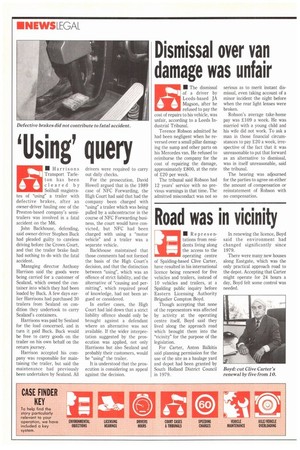'Using' que
Page 12

If you've noticed an error in this article please click here to report it so we can fix it.
• Harrisons Transport Tarleton has been cleared by Solihull magistrates of "using" a trailer with defective brakes, after an owner-driver hauling one of the Preston-based company's semitrailers was involved in a fatal accident on the M6.
John Backhouse, defending, said owner-driver Stephen Buck had pleaded guilty to careless driving before the Crown Court, and that the trailer brake fault had nothing to do with the fatal accident.
Managing director Anthony Harrison said the goods were being carried for a customer of Sealand, which owned the container into which they had been loaded by Buck. A few days earlier Harrisons had purchased 30 trailers from Sealand on condition they undertook to carry Sealand's containers.
Harrisons was paid by Sealand for the load concerned, and in turn it paid Buck. Buck would be free to carry goods on the trailer on his own behalf on the return journey.
Harrison accepted his company was responsible for maintaining the trailer, but said the maintenance had previously been undertaken by Sealand. All drivers were required to carry out daily checks.
For the prosecution, David Howell argued that in the 1989 case of NFC Forwarding, the High Court had said that had the company been charged with "using" a trailer which was being pulled by a subcontractor in the course of NFC Forwarding business, the court would have convicted, but NFC had been charged with using a "motor vehicle" and a trailer was a separate vehicle.
Backhouse maintained that those comments had not formed the basis of the High Court's decision, and that the distinction between "using", which was an offence of strict liability, and the alternative of 'causing and permitting", which required proof of knowledge, had not been argued or considered.
In earlier cases, the High Court had laid down that a strict liability offence should only be brought against a defendant where an alternative was not available. If the wider interpretation suggested by the prosecution was applied, not only Harrisons but also Sealand and probably their customers, would be "using" the trailer.
It is understood that the prosecution is considering an appeal against the decision.












































































